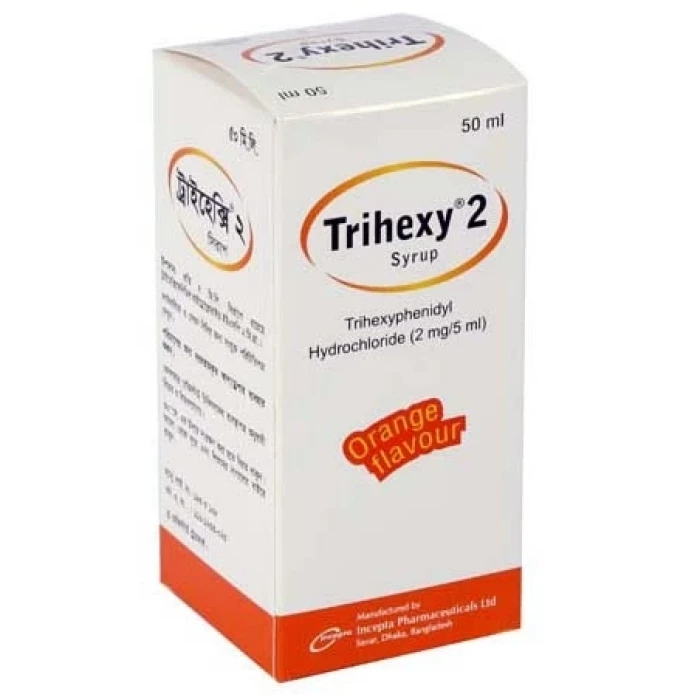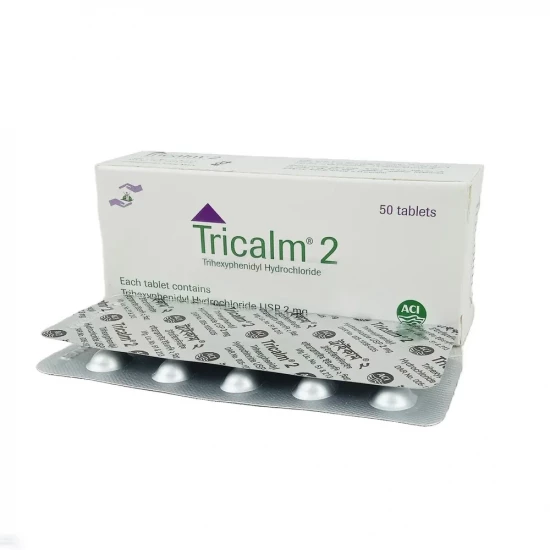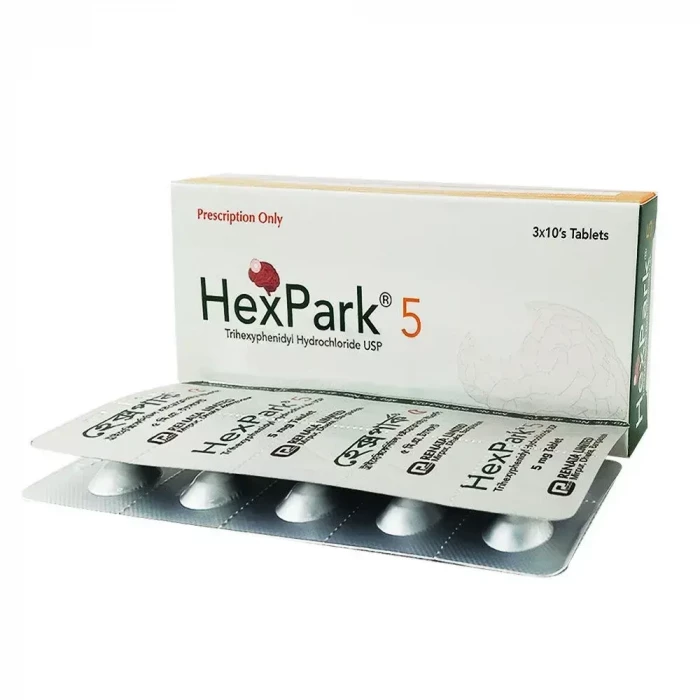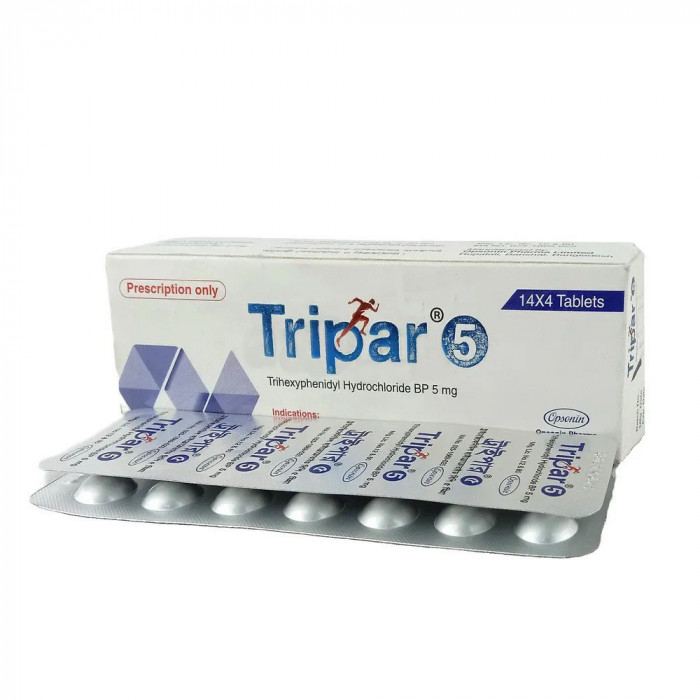
✔ 100% Authentic Product
👁️ Currently Viewing 2750
Trihexy 2mg/5ml Syrup
Trihexy is used as an adjunct treatment for various forms of Parkinsonism, including postencephalitic, arteriosclerotic, and idiopathic types. It is often effective when used alongside levodopa for these conditions. Additionally, it is indicated for managing extrapyramidal disorders caused by central nervous system (CNS) drugs such as dibenzoxazepines, phenothiazines, thioxanthenes, and butyrophenones. Only take medication as advised by a registered physician.
Discount
Price: ৳ 94
MRP:
৳
100
6%
Off

100% Genuine Products, Guaranteed

Safe & Secure Payments, Always

Fast, Secure & Efficient Delivery

Proper Packaging
 Cash on Delivery - All over Bangladesh
Cash on Delivery - All over Bangladesh Regular Delivery - 12-24 Hours, Dhaka City* Charge Tk.39-59
Regular Delivery - 12-24 Hours, Dhaka City* Charge Tk.39-59 Regular Delivery - 24-48 Hours, Other Cities* Charge Tk.99-110
Regular Delivery - 24-48 Hours, Other Cities* Charge Tk.99-110
 ফ্রি ডেলিভারিঃ - ৯৯৯ টাকা+ অর্ডারে, ঢাকা
শহরে
ফ্রি ডেলিভারিঃ - ৯৯৯ টাকা+ অর্ডারে, ঢাকা
শহরে ফ্রি ডেলিভারিঃ - ২৯৯৯ টাকা+ অর্ডারে, ঢাকার
বাহিরে
ফ্রি ডেলিভারিঃ - ২৯৯৯ টাকা+ অর্ডারে, ঢাকার
বাহিরে
100% Genuine Products, Guaranteed
Safe & Secure Payments, Always
Fast, Secure & Efficient Delivery
Proper Packaging
 Cash on Delivery - All over Bangladesh
Cash on Delivery - All over Bangladesh Regular Delivery - 12-24 Hours, Dhaka City* Charge Tk.39-59
Regular Delivery - 12-24 Hours, Dhaka City* Charge Tk.39-59 Regular Delivery - 24-48 Hours, Other Cities* Charge Tk.99-110
Regular Delivery - 24-48 Hours, Other Cities* Charge Tk.99-110 ফ্রি ডেলিভারিঃ - ৯৯৯ টাকা+ অর্ডারে, ঢাকা
শহরে
ফ্রি ডেলিভারিঃ - ৯৯৯ টাকা+ অর্ডারে, ঢাকা
শহরে ফ্রি ডেলিভারিঃ - ২৯৯৯ টাকা+ অর্ডারে, ঢাকার
বাহিরে
ফ্রি ডেলিভারিঃ - ২৯৯৯ টাকা+ অর্ডারে, ঢাকার
বাহিরে
✅ Description:
Trihexyphenidyl Hydrochloride is classified as an anti-spasmodic agent primarily used as an adjunct therapy in the treatment of Parkinson’s disease and extrapyramidal symptoms (movement disorders caused by certain medications). Parkinson’s disease is a progressive neurological condition characterized by movement difficulties.
Trihexyphenidyl Hydrochloride helps by relaxing muscles and controlling nerve impulses that regulate muscle function. It also helps balance neurotransmitters (chemical messengers) in the brain, which improves muscle control and reduces stiffness, enabling more natural movement.
Take trihexyphenidyl hydrochloride exactly as prescribed by your doctor based on your condition.
Common side effects include:
- Nausea
- Vomiting
- Dizziness
- Constipation
- Weakness
- Headache
- Dry mouth
- Decreased urination
- Drowsiness
- Feeling nervous or restless
These side effects are typically mild and resolve over time, but if they persist, consult your doctor.
- Do not stop taking Trihexyphenidyl Hydrochloride abruptly without consulting your doctor.
- Avoid use during pregnancy or breastfeeding unless advised by your doctor.
- This medication may cause drowsiness or dizziness, so avoid driving or operating machinery until you feel fully alert.
- Not recommended for children as its safety and efficacy have not been established.
- Avoid alcohol, as it may increase drowsiness and dizziness.
Safety Advices

Alcohol
UNSAFE
Avoid consumption of alcohol while taking Trihexy Syrup as it may cause increased dizziness and drowsiness.

Pregnancy
CONSULT YOUR DOCTOR
Trihexy Syrup belongs to pregnancy category C. Please consult your doctor before taking Trihexy Syrup if you are pregnant or planning for pregnant. Your doctor will prescribe only if the benefits outweigh the risks.

Breastfeeding
CONSULT YOUR DOCTOR
It is unknown whether Trihexy Syrup passes into breast milk. Consult your doctor before taking Trihexy Syrup if you are breastfeeding.

CAUTION
Trihexy Syrup may cause dizziness, drowsiness, and blurred vision. Avoid driving and handling machinery if you experience these symptoms.

CAUTION
Dose adjustment may be needed in patients with kidney impairment. Please consult your doctor if you have kidney impairment or any concerns regarding Trihexy Syrup.

CAUTION
Dose adjustment may be needed in patients with liver impairment. Please consult your doctor if you have a liver impairment or any concerns regardingTrihexy Syrup
✔️ Uses of Trihexy Syrup
Treatment of Parkinson's disease
✔️ How does Trihexy Syrup work?
Trihexy Syrup improves muscle control and reduces stiffness, thereby helps the muscles move naturally.
✔️ Side Effects of Trihexy Syrup
- Nausea
- Vomiting
- Dizziness
- Constipation
- Weakness
- Headache
- Dry mouth
- Decreased urination
- Drowsiness
- Feeling nervous or restless
✔️ Quick Suggestions:
- Dry mouth may occur as a side effect. Frequent mouth rinses, good oral hygiene, increased water intake, and sugarless candy may help.
- It may cause dry eyes. Avoid wearing contact lenses and inform your doctor if it bothers you.
- It may cause dizziness and sleepiness. Do not drive or do anything requiring concentration until you know how it affects you.
- Monitoring of intraocular pressure is required while taking this medicine, as an increase in eye pressure may cause blurry vision.
- Take special care with your dental hygiene while using Trihexy Syrup (like brushing, and flossing), and have regular dental check-ups.
- Inform your doctor if you suffer from glaucoma or if you have trouble passing urine.
✔️ Indication of Trihexy Syrup
Trihexy has a direct inhibitory effect on the parasympathetic nervous system and also relaxes smooth muscles, both through direct action on muscle tissue and by inhibiting the parasympathetic system.
✔️ Pharmacology
Trihexyphenidyl is a non-selective muscarinic acetylcholine receptor antagonist, with a higher affinity for the M1 subtype. In vivo, studies show it binds more readily to central muscarinic receptors in the cerebral cortex than peripheral ones. Other studies suggest Trihexyphenidyl may influence nicotinic acetylcholine receptor signaling, indirectly enhancing dopamine release in the striatum. Though useful in treating Parkinson’s disease and movement disorders, its full mechanism of action remains unclear.
✔️ Dosage & Administration of Trihexy Syrup
Trihexyphenidyl should be taken with food, ideally during meals. If dry mouth occurs, take the medication before meals; if drooling or nausea occurs, take it after meals. It is important to take the medication at the same time each day.
Adult Dosage
- Drug-induced extrapyramidal symptoms: 5-15 mg per day, administered orally in divided doses every 6-8 hours.
- Parkinson's Disease: Start with 1 mg daily, increasing the dose gradually by 2 mg every 3-5 days until a daily dose of 6-10 mg is reached, divided into 3-4 doses.
- Maintenance: 5-15 mg per day, divided into doses every 6-8 hours.
- Parkinsonism: 5-15 mg per day, divided into doses every 6-8 hours.
- Elderly patients: May require lower doses.
Pediatric Dosage
Safety and efficacy in children have not been established.
Overdose Effects
Doses up to 300 mg of Trihexyphenidyl have been taken without fatal consequences, but rare deaths have occurred when combined with CNS depressants or in patients with compromised respiratory conditions. Symptoms of overdose include signs of parasympathetic blockade and neuropsychiatric disturbances. Treatment involves symptomatic management, gastric lavage, and CNS depressant therapy.
✔️ Interaction
Cannabinoids, barbiturates, opiates, and alcohol may enhance the effects of Trihexy, creating the potential for abuse. Combining Trihexy with CNS depressants like alcohol may increase sedation. Anticholinergic effects can be intensified by monoamine oxidase inhibitors and tricyclic antidepressants. It is not recommended to use prophylactic anticholinergics to prevent drug-induced Parkinsonism during neuroleptic therapy, as this may increase the risk of tardive dyskinesia. The dosage of Trihexyphenidyl or levodopa may need adjustment during concurrent use, as involuntary movements may increase.
✔️ Contraindications
Trihexyphenidyl is contraindicated in patients with hypersensitivity to the drug and those with narrow-angle glaucoma. Blindness due to long-term use in narrow-angle glaucoma patients has been reported.
✔️ Pregnancy & Lactation
There is limited data on Trihexyphenidyl use during pregnancy. It should only be used if the potential benefit to the mother outweighs the risks. It is not known if the drug is excreted in human milk, but caution is advised when administering it to nursing mothers, as it may suppress lactation.
✔️ Precautions & Warnings
Patients starting on Trihexy should undergo a gonioscopy to assess the risk of narrow-angle glaucoma and be monitored for increased intraocular pressure. Caution is advised in hot weather or with conditions that affect sweating, as anhidrosis and fatal hyperthermia have been reported. Gradual withdrawal of the drug is essential to avoid neuroleptic malignant syndrome (NMS).
✔️ Storage:
Store in a dry place at temperatures below 30°C, away from light.
⚠️Disclaimer:
At ePharma, we’re committed to providing accurate and accessible health information. However, all content is intended for informational purposes only and should not replace medical advice from a qualified physician. Please consult your healthcare provider for personalized guidance. We aim to support, not substitute, the doctor-patient relationship.













